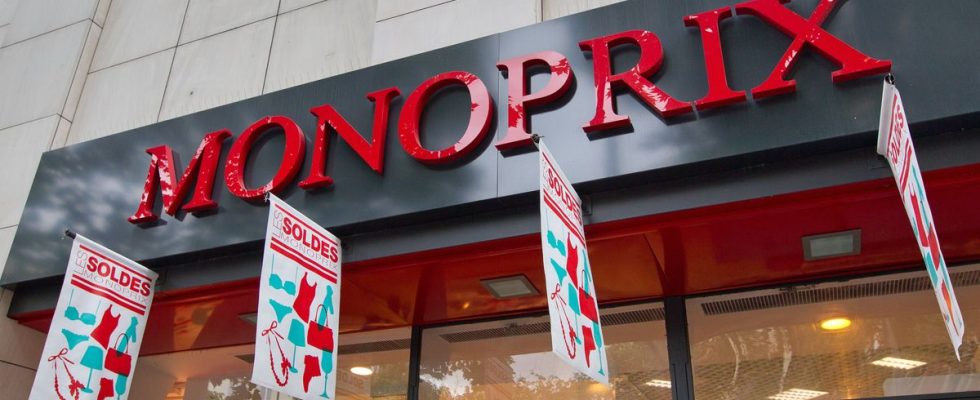“It’s certain that the holidays aren’t the most cheerful…” Linh*’s polite smile struggles to hide her worry. For this employee of a Monoprix store in the 13th arrondissement of Paris, the current situation of the Casino group does not encourage joy. Worse, she confides growing anxiety over the weeks and the wait for the ax that will determine the future of her job.
For several months, the Casino group has been in danger. With 6.5 billion euros in debt, the Saint-Etienne food distribution giant is waiting to find out its buyer. The “hypers” and “supers” should fall into the hands of competitors Auchan and Intermarché. For smaller brands, a backup plan will have to determine the names of the buyers in the coming weeks. The plan concerns all of France, but it is of particular interest to Parisians since the Casino group represents more than 50% of food distribution in the capital (compared to “only” 10% nationally).
Intramuros, more than 500 stores waiting
You just need to walk around for a few hours to see the Monoprix, Franprix, Naturalia, etc. brands. in Paris. Not a neighborhood without a minimum of two group stores. Some streets even have 4 or 5 establishments. In total, the group has more than 500 stores in the capital (360 Franprix, 60 Monoprix, 42 Monop’, 5 Monop’Daily, 78 Naturalia, to which must be added the Casino supermarkets, Spar and Vival). Considerable importance for Parisians’ daily shopping, but also for employment.
For the “small” ones, no risks according to the possible buyers, the Czech Kretinsky, the Frenchman Ladreit de Lacharrière and the British fund Attestor, who say they want to focus their strategy on local commerce. Contacted by 20 minutes, the group ensures that there will be no sale or closure of local stores upon takeover. Words intended to reassure authorities and employees alike.
The fear of closures and suddenly “at the Carrefour”
Missed. A quick tour of Parisian brands first shows that the situation is sensitive: We do not comment. The director of a department store on the Left Bank even assures us that any request must be made to the group’s headquarters and exclusively to this address. One of his managers, who was also fearful, still ended up blurting out: “There are no official instructions. But it’s tense, it’s not the time to alienate someone “up there”. »
An employee, more willing to open up, confides: “We are all worried. We don’t know what the future will hold. No one wants to talk so as not to risk losing their job, but between us, we discuss it a lot. » In addition to the group’s difficult situation, employees are worried about knowing how they will be eaten.
“The biggest fears are seeing stores closed, workforce reductions or a “Carrefour” blow. » This expression, which often comes up in the mouths of the employees interviewed, refers to the strategy implemented by Alexandre Bompard since his arrival at the head of the distribution giant and which consists of switching stores to “rental management”. A way of outsourcing expenses by taking these stores out of the group’s fold.
In rental management, collective agreements “jump”
“For the moment, they assure that this is not the project,” explains Lionel Mamboumbia, central union delegate at the CGT Casino Paris, “until they change their mind. » The risk for employees: see all “jump” company agreements. “We know that beyond the legal fifteen months, they can put stores under franchise or rental management. And then, we can say goodbye to collective agreements, social benefits and a lot of jobs. And for stores that could not be taken over, it would be closure,” adds the trade unionist.
“These people are hyper-optimizing everything. What they want is profitability and more profitability. In general this means that we will lay off part of the workforce and those who remain will have to work even more. Look at what’s happening with franchisees. The stores are less well maintained and the employees have much more difficult working conditions,” comments Linh*.
Paris City Hall worried and powerless
Although it can hardly intervene in such a private matter, Paris City Hall is keeping an eye on the group’s situation. In several respects, it directly concerns the lives of Parisians, as confirmed in 20 minutes Nicolas Bonnet-Oulaldj, Anne Hidalgo’s deputy in charge of commerce: “We are first talking about several thousand jobs in Paris and the Ile-de-France region (The Casino group was unable to give us any figures – Editor’s note). But also the daily life of the inhabitants. »
What are the consequences for competition in the capital? On the diversity of the offer? On the purchasing power of Parisians? On neighborhood life? The elected official raises many fears: “These small food stores are part of the customer journey. We buy our laundry detergent at the supermarket, but then we go to the butcher, the market gardener, etc. This will no longer happen if these stores are transformed into fast food or luxury stores. »
Fear of Drive
Or worse according to the elected official, in “drive”: “We feared a switch from these stores to sales on the Internet. These premises, in addition to eliminating jobs, increase delivery needs. A drive means at least 8 to 10 delivery trucks per day. A disaster for the city. »
The only solution for the city is to hope that the premises will be put up for sale in the event of store closures in order to be able to exercise its right of pre-emption and try to reoccupy the premises with a business useful to the neighborhood via its Paris Commerce program.
Very real fears about a hypothetical future which should be answered in the weeks to come. In fact, the group’s shareholders are asked to vote on January 11 on the safeguard plan which is planned to be initiated from the months of March and April.
*The first name was changed at his request

